Louisiana
Kentucky

Illinois
Texas
Texas
North Carolina/Tennessee
Texas
Florida
Texas
Missouri
Oklahoma
Michigan
New Mexico
Arizona
LA
New York
MS
Kentucky
Maine
West Virginia
Texas
Georgia
Belize
Jamaica
Puerto Rico (U.S.)
Cuba
Haiti
Bahamas
Costa Rica
South Africa
South Africa
Namibia
Holy Land
Indonesia







Sr. High & Up
Year Round
$785/person (7-Day Trip)
Community Overview
Due to safety concerns and limited capacity because of COVID-19, EM will not be bringing mission trip teams to Haiti in 2021. We hope to continue serving alongside our local ministry partners in 2022.
Click to view all 2021 Mission Trip communities!
—
Come serve together in Haiti and be part of something much bigger than a week-long project! On your mission trip, your team will get a glimpse of the challenges people face in Haiti—including poverty, injustice, and corruption. Despite staggering unemployment rates, failed international charity efforts, and the still-visible effects of the 2010 earthquake, you’ll meet Haitian people who are resilient and have found hope.
Short-term Haiti missions teams have the opportunity to make a long-term impact by supporting ministries and local leaders who are stepping up and seeking progress for their communities. Your team will follow the lead of local Haitian staff who not only coordinate the details of mission trips but also help youth in their community through education and mentoring.
As your team serves through work projects and children’s ministry, you’ll be an encouragement and practical support to everyone working behind the scenes. Will you come and experience the joys and challenges of life in this unique culture on a mission trip to Haiti?
Preview Mission Trips to Haiti! — Check out EM Vision Trips for team leaders.
Meet our Local Partners
Local Partners
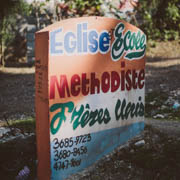
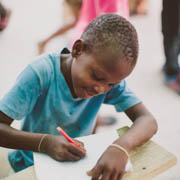
Details & Logistics
Trip Options
Petit Goave (Coastal Town)
Petit Goave is located west of Port-Au-Prince along the coast, and even though it is the main city for its region it is relatively small. This area has long suffered from severe poverty, and it was hit hard by the earthquake of 2010. This trip gives teams the opportunity to truly experience a typical Haitian city while serving and partnering with the local people.
Marchasse (Rural Mountain Village)
This trip takes you deep into the rural mountains of Southeast Haiti where teams must be prepared to leave the comforts of home behind. There is no electricity or running water in Marchasse, and most people survive through subsistence farming in the midst of extreme poverty. Teams in Marchasse participate in practical projects to meet tangible needs in the community.
Medical Trips (Various Communities)
Do you have a team with trained medical professionals? If so then your assistance is needed in Haiti. Many Haitian people lack access to adequate medical care, so our medical teams assist with walk-in clinics that provide basic services to those in need. These are more specialized, so we will assign each medical team to a specific location based on their skills and the current needs in our partner communities. If you are interested in a medical trip but you don't see any dates listed, fill out an interest form and let us know the dates you want. We'll do our best to make it happen!
Note: Our medical teams will need to bring at least 1 licensed doctor and 1 licensed nurse and all necessary medical supplies/equipment. You provide the medical knowledge and we take care of the logistics.
Community Profile
Natural Environment
Haiti is a beautiful country characterized by miles of coastline and a scenic, mountainous interior. Sadly, much of the natural beauty is obstructed by cities with poor infrastructure and massive deforestation because of harmful farming techniques. Port-Au-Prince is especially plagued by overcrowding, and the surrounding ocean waters were negatively affected when tons of debris from the earthquake were dumped into the sea. Still, many of Haiti's more remote coastlines remain home to beautiful beaches with clear blue waters, and numerous smaller towns and mountainous villages retain much if the land's natural charm.
As with all Caribbean Islands, the weather in Haiti is typically hot. The winter months of December and January tend to be the mildest, so while it is still hot during the day it can become somewhat cool at night. There are a few remote mountainous regions that actually can be quite cool. Haiti receives a great deal of precipitation, but it is sunny most of the time. Hurricanes and tropical storms strike on occasion, and heavy rainstorms are common during much of the year.
Lifestyle
Life for most people in Haiti is simple, and modern conveniences are limited. Most people in urban areas do have electricity, but outages are common, and the vast majority of Haitian families do not have access to running water. Often urban homes have a large underground water tank that becomes a primary source of water for cooking and bathing. In rural areas, people typically drink from wells or natural springs, and sometimes struggle to find safe drinking water. Life moves at a slower pace in Haiti, and numerous hours are devoted to simple tasks such as cooking, cleaning, and laundry. Typical Haitian homes will have multiple generations of extended family living together, and there is a strong sense of community in Haitian neighborhoods.
Needs
Poverty is the norm in Haiti, and most people lack adequate access to basic commodities such as food, water, and shelter. The water supply in earthquake affected areas is universally contaminated so people are forced to purchase bottled water or the cheaper bag water. Further, many families displaced from the earthquake still do not have an adequate home. It is evident that the poor economy and political instability remain at the root of Haitian poverty, and until people have adequate opportunities for employment widespread poverty will surely remain. Employment is scarce everywhere in Haiti. In rural areas, there is a lack of development and in Port-Au-Prince there is severe overcrowding combined with poor infrastructure. In spite of the severe needs, there is a great deal of vitality in the Haitian people, and mission teams are always overwhelmed by the energy and passion of their newfound Haitian friends.
Language
Haitian Creole is the dominant language throughout Haiti. This is primarily French-based, but it also borrows from Spanish, English, and African dialects. While it has been put into written form, Creole originated as a spoken language developed by former African slaves and to this day it is primarily a street language. Because of this French is the business language, and any educated Haitian is expected to fluently read and write in French, yet many Haitians still only speak Creole.
Religion
According to the CIA World Factbook, Haiti is 80% Catholic with most remaining Haitians split between the various protestant denominations. This being said, roughly half the population still practices Voodoo, and this maintains a significant place in Haitian society. Tracing all they way back to African religious practices, Voodoo is intricately tied to the Catholic church in Haiti, and Voodoo ceremonies and temples are common throughout the country. Typically, Haitians who practice Voodoo have strong opposition to protestant Christianity.
History
When Christopher Columbus discovered the New World in 1492, he landed on an island which he claimed for Spain, and it subsequently came to be known as Hispaniola. In 1697 Spain ceded the western portion of Hispaniola to France, creating the French colony of Saint-Domingue. Throughout the 18th century, Saint-Domingue developed into the leading sugar producing island, and the African slave population became vital to the expanding economy. During this French colonial phase nearly 800,000 slaves arrived, and by 1789 African slaves outnumbered the free population four to one. (Nations Online. History of Haiti)
It was during this late 18th century period that the slave population began to mount widespread resistance to French colonial rule. Rapidly growing communities of runaway slaves formed in the remote interior of the island, and they began to revolt by engaging the colonial militia and harassing slave owners. These engagements continued with little cohesion until Toussaint Louverture, a former slave, began to further organize the resistance. Next two generals named Jean-Jacques Dessalines and Henry Christophe began to assume leadership, and they were ultimately victorious in 1804. As a result, the French colony of Saint-Domingue became the independent nation of Haiti.
This was an outstanding victory for the slave resistance, and it caused grave concern among slave owners across the Caribbean and in the United States who feared their slaves would also revolt. Nonetheless, independence proved to be a challenging process. It wasn't until 1825 that France officially recognized Haiti as an independent nation, but this came at a high cost because Haiti was forced into a 100 million franc debt that was paid annually until 1887. (Encyclopedia Britannica. Haiti) In reality, this contributed to an economic void from which the nation has never fully recovered.
Plagued by economic struggles and political instability, 19th century Haiti saw multiple power changes and revolutions. Ultimately, a culture of class developed where the light-skinned French speaking (mulatto) population became the elite, and the dark-skinned people of African descent were primarily relegated to poor, working class status. (Encyclopedia Britannica, Haiti) Sadly, this distinction can still be found in Haiti today.
During the 20th century, the United States increasingly began to control Haiti, and from 1915 to 1934 Haiti was placed under US military control. Following US occupation, tensions between Haiti and the neighboring Dominican Republic increased, and there was over a decade of political jockeying by the Haitian elite which often turned violent.
In 1957 Francois Duvalier known as "Papa Doc" was elected president and so began nearly 3 decades of Duvalier rule. Papa Doc ruled until his death in 1971 when his son Jean-Claude "Baby Doc" took over power which he retained until he was forced into exile as a result of widespread opposition in 1986. The Duvalier era brought greater stability and improved infrastructure, so to this day many Haitians look back at it as a time of comparable prosperity. This, however, was not without a cost because the Duvalier's often used ruthless tactics to retain power, and many political opponents are reported to have died at their orders.
The younger Duvalier's exile plunged Haiti into another era of great political instability with many changes of power. While Haiti technically became a democracy and continues as such to this day, violence and accusations of corruption have made it difficult to have uncontested election results. Furthermore, the majority of Haitians remain relegated to poverty with limited access to quality education, and this has made democracy a challenge. The only natural democratic succession of power occurred when Rene Preval succeeded Jean-Bertrand Aristide in 1995, but this apparent stability was short lived. The volatile political climate has ensured ongoing economic struggles and helped to keep Haiti in its position as the poorest country in the western hemisphere.
On January 12, 2010, a violent earthquake rocked Port-Au-Prince and surrounding areas leaving an estimate of over 300,000 dead and 1 million homeless. This proved utterly devastating, and as if that wasn't enough it was followed by a massive cholera outbreak nine months later in October. As a result of the earthquake, millions of dollars of foreign aid and numerous volunteers poured into Haiti, as it became a primary focus of many international relief organizations.
Sources:
Nations Online. History of Haiti
Encyclopedia Britannica. Haiti
The CIA World Factbook. Haiti
Lodging, Food & Transportation
Lodging
We will arrange safe, secure lodging for your team while you are in Haiti. The specifics of your accommodation will vary depending on your individual trip location, but in general, you should be prepared to leave the comforts of home behind. Yes it will be hot, and no there won't be air conditioning but you will be catching a true glimpse of the Haitian experience.
Food & Water
We will have a team of Haitian cooks who prepare wonderful Haitian food for your team. For most trips, you can expect to be provided sack lunches that can be brought to worksites or service locations, but then you will have a hot breakfast and supper. Most teams love the Haitian food!
Clean drinking water will be available for your team at the housing facilities 24/7, and water coolers will be available at all work sites and service locations.
Transportation
All transportation while you are in Haiti is included in the cost of your trip. Our staff in Haiti will meet you at the airport with buses to transport your team to your housing location, and we will arrange similar transportation and accompany you on your return trip to the airport.
Passports & Travel Documents
Each team member must carry a valid passport. If you do not have a valid passport, it is of the utmost importance that you apply as soon as possible. The processing time for a Passport can take several weeks once your application has been submitted. An expired Passport is not considered valid.
Health & Safety
EM’s Health & Safety Plan:
Staff Certification
All Summer Staff are certified in First Aid and CPR.
Nearest Hospital
Hospital Generale in Port-Au-Prince.
Medical kits
Medical kits that include first-aid supplies for general accidents and ailments are provided for each site. In international locations like Haiti, we will also carry a Trauma Kit or First Responder Kit. In these remote locations, we will have medications like Tylenol, Ibuprofen, Benadryl, and Imodium on hand. We make these available to adult team leaders for their sole discretionary use with their team members. EM Staff will not dispense any medications. Emergency response plan: Based on the severity of each emergency, EM has a plan for an appropriate response.
- If a team member becomes seriously ill, they will be taken to a local doctor to receive appropriate medical attention and medications. If they are a minor, their Team Leader along with our staff will accompany them to the clinic. If needed, their parents will be contacted. Their recovery will be carefully monitored by our staff.
- If there is an accident that requires a doctor, but is not life-threatening and does not have the potential to cause permanent damage, Experience Mission staff will locate the Team Leader, contact parents or guardians (providing the injured is a minor) and provide safe but quick transportation to a local clinic.
- In the event that an accident occurs which is life-threatening or has the potential for permanent damage, emergency medical care will be secured and arrangements will be made if necessary, to transport the injured person to the United States as quickly as possible providing they are serving in one of our International locations. In our domestic locations, local 911 services will be contacted immediately. The family will be contacted immediately to assist in guidance for an appropriate response.
All medical care is the sole responsibility of the team member. Experience Mission requires every team member to be covered by domestic medical insurance and recommends that team members traveling abroad carry additional international travel insurance to cover any medical needs their domestic medical insurance may not cover.
Immunizations: As with all mission trips, it is essential that volunteers are up to date on all childhood immunizations. Each volunteer must also have a tetanus shot.
For more information about health concerns and recommended immunizations, you can visit the CDC travelers guide to Haiti. You should consult your local doctor prior to receiving any immunizations.
Registration & Payment
Experience Mission has specific policies regarding team registration and withdrawal. Please refer to the document below for specifics.
View EM’s Mission Trip Registration Policy
INDIVIDUALS
All volunteers on a week-long EM mission trip to Haiti must be part of a team of at least six (6) people, with at least one team member age 21 or older to serve as the Team Leader. Not part of a group? All young adults ages 18-30 are eligible to apply for EM's IMMERSION program.
Haiti Trip FAQs
Is the place where we would stay safe?
Yes. While there is always a risk when traveling abroad, we make certain our housing facilities are safe. In every community where we work, we partner with trusted local people who are responsible to ensure team safety.
How will I know where to go at the airport? Who will meet me in-country?
You will have access to specific instructions on how to go through customs and where to meet our staff at the airport once you register for your trip. We will also provide you with the phone number of our staff on the ground to call should you get lost. You can expect a call from this person the week of your trip to communicate any special details.
*When arriving in Haiti, we ask that you do not wear matching shirts that will identify you as a team. It can bring unwanted attention to you and your group.
Will the items I bring be safe while we are working?
Yes. Your bedding and luggage will be housed in a secure location; however, we strongly recommend that you do not bring anything of high value with you to Haiti as there is always a risk that things can be lost or stolen when traveling.
Will the food be clean and safe?
Yes. We take extra precautions to ensure that the food will be safe. Our team of cooks is trained in how to prepare food that is safe for non-Haitian stomachs.
Will there be clean water to drink?
Yes. Purified bottled drinking water will be provided for all team members at the lodging location and during the day at the worksites and ministry sites.
What will we be doing on our mission trip?
Mission trips in Haiti typically consist of a mixture of highly physical construction projects and kids club. We also organize medical trips for teams with trained medical professionals. Be sure to check the details for your specific trip because individual trips may vary.
What is cell phone coverage like in Haiti?
Some cell phone companies do have service in Haiti but the coverage is limited in rural locations. For an additional charge, you can add a temporary international calling plan to your phone. Each team member should check with their respective cell phone carrier about service and plans. We encourage teams to have at least one team member with an international plan.
Is there internet access in Haiti?
There is no reliable internet access at the facility but EM staff members will have internet access on their smartphones. EM staff members will not be able to use their phones to communicate on behalf of team members unless it is an emergency.
What is the weather like in Haiti?
Haiti is one the west half of the Caribbean island of Hispaniola. The weather in this region tends to be very hot and humid most times of the year.
What shots and immunizations do I need to get before my mission trip?
In addition to being up-to-date on all childhood vaccinations and boosters, we strongly recommend all participants check with the Center for Disease Control (www.cdc.gov) as well as their local physician and closely follow their directions for recommended shots and immunizations. Click here for the CDC travel page for Haiti.
Will I need to purchase additional travel insurance on my mission trip?
We strongly recommend that every team member has personal medical insurance. All volunteers should check with their personal medical insurance provider regarding international coverage. If your personal insurance will not cover you, we strongly recommend purchasing additional travel insurance. Short-term travel insurance can be purchased separately through a local insurance company.
If you cannot obtain travel insurance through a local provider, upon team registration, we will direct you to a link for "Travel Insurance" on our website. This link will connect you and your team members to "Group International Travel Solutions," a trusted travel insurance company.
How much do Haiti mission trips cost?
Mission trips to Haiti in 2021 are $769/person. The fee covers ground transportation, lodging, all of your meals, trip-related expenses, and funds to support local staff who will be leading your trip.
Are there any extra fees I should be aware of?
Yes. There is a $10 "tourist" fee to enter Haiti. This payment must be made with cash in USD. We recommend bringing exact change (per person) for convenience.
Are there any age limits for participants going to Haiti?
Yes. At this time, the age limit for participants is High School age and older. If you have an adult team member who would like to bring their mature junior high age child, proper permission must be obtained from Experience Mission beforehand. We offer Jr. High mission trips in a variety of other communities.
What seasons do you offer Haiti mission trips?
Trips are offered in Haiti year-round! Don't see a date that works for you? Contact us about planning a custom trip.
Do you offer spring break trips in Haiti?
Yes! Haiti is a popular destination for spring break mission trips. Teams for spring break typically arrive on a Saturday and return home the following Friday.
Will we work with children in Haiti?
Yes! You will work with children in a variety of settings. Most teams will have the opportunity to lead a Kids Club.
What paperwork is required for this mission trip?
Each team member will need to fill out a team member registration form and liability waiver and all adults are required to pass a background check. Additionally, each team member will need to have a valid passport that expires at least six months after traveling to Haiti.
Will I need a visa for a Haiti mission trip?
You do not need to apply for a visa ahead of time. You will need to go through customs upon arrival and provide information about the nature of the trip. We will provide you with all the resources you need for this prior to your departure.
Where will my team stay in Haiti?
Teams will stay at a local church in Haiti. There is access to running water and electricity, but teams should expect rustic-style lodging with no air conditioning and we do recommend bringing along bug nets for added comfort.
Are Haiti mission trips safe?
With heightened security advisories from government agencies, we take your team's safety very seriously. We have long-term partnerships and work in a rural community far from notorious areas associated with crime. Feel free to contact us for more specific information.
When can I arrive in Haiti?
We ask that teams arrive between 11am and 2pm on the first day of their selected trip. If you are unable to arrive in this window of time, please contact your mission trip support person prior to booking airfare so that we can ensure that you will have transportation available upon arrival.
Is airfare included in EM trip fees?
No. Airfare is a separate expense, and you will book this on your own.
What local culture will we experience on our Cuba mission trip?
Teams will experience authentic Haitian culture and hospitality by local guides. All meals will be prepared by local cooks, and you will have the opportunity to learn about Haiti's complex history from local people.
How does this trip impact the local community?
All work projects are focused on community development and decisions about what the projects will be are left almost entirely up to local leadership. As a result, real community needs are being met and projects have a lasting impact. Teams serving in Haiti will also have the opportunity to partner with RISING, a Haiti-based education empowerment program.
Does EM offer any other mission trips to Latin America or the Caribbean?
Yes! We offer trips to Jamaica, Cuba, Costa Rica, and Puerto Rico.
Have more questions about Experience Mission trips? Check out our general FAQs, or call our support team at 888-475-6414.
Upcoming Trip Dates: Haiti
We’d love to connect with you!
Dont hit a snag in your mission trip planning! Fill out an interest form or call (888) 475-6414 (Mon-Thu, 9am-5pm ET) to ask questions and learn more about upcoming EM mission trips.
Recent Blogs & Stories

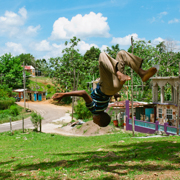
Hear from recent EM mission
trip team leaders!
Hear from recent EM mission trip team leaders!

Carline D. served in Savannah, Georgia
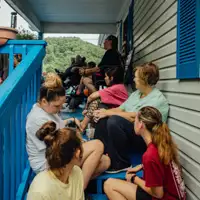
Nikki K. served in Pikeville, Kentucky

Christopher G. served in Rincon, Puerto Rico

Jeremy M. served among the Navajo Nation in Arizona
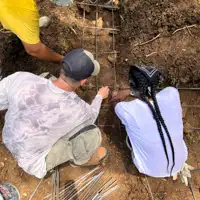
Jennifer S. served in Rincon, Puerto Rico
What’s the best trip for your group? Answer 5 multiple choice questions and get instant mission trip recommendations!
What’s the best trip for your group?
Answer 5 multiple choice questions, and get instant mission trip recommendations!
Make your Mission Trip a reality!

1
Fill out a Group Interest Form
Only takes a minute! Simply choose the community and trip dates you’re most interested in—no commitment necessary.
2
We’ll personally follow up with you this week
Answering your questions and walking you through the process of finding the best trip, registering your group, and preparing to serve together.
3
You and your team serve on a cross-cultural mission trip!
Organized and led by EM field staff or local partners, your trip will bring encouragement and light to people in difficult circumstances, as you learn what it means to care for all people, whoever and wherever you are.
Read our Mission Trip FAQ and Registration Policy. If you have additional questions or don't see the dates you're looking for, fill out an interest form for the trip closest to what you're hoping for and let us know the needs of your group.
Don't let fundraising slow you down!
Download the free EM Fundraising Guide for all our best tips and ideas for making fundraising for your next trip fun and easy.
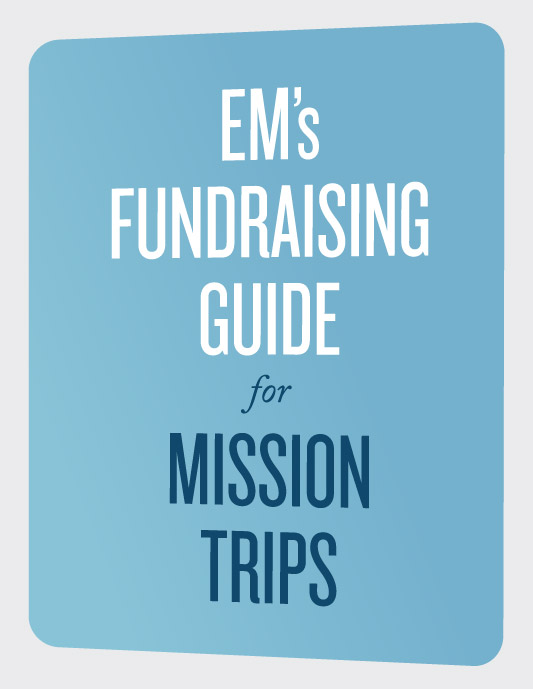

Don't let fundraising slow you down!
Download our free Fundraising Guide for all our best tips and ideas for making fundraising for your next trip fun and easy.
Site developed and hosted by Skycog, Inc.

